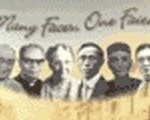
The Malayan Christian Council, which was established in 1948 to promote Christian unity among the Churches and Christian organizations in Malaya and Singapore, was succeeded in 1961 by the Council of Churches of Malaysia and Singapore.
Later, in view of Malaysia and Singapore having separated and become independent sovereign nations, it was considered desirable to have separate Councils of Churches for each nation and, therefore, the National Council of Churches of Singapore was duly constituted in Singapore on 24th July, 1974 to carry on and fulfill the vision and aspirations of the founders.




